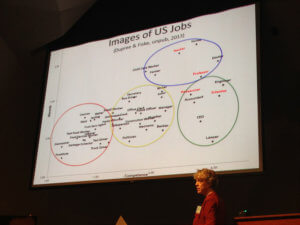If scientists rely on evidence for their research, why do they rely on hunches when they communicate their research?
This was the challenge that framed the kick off of the National Academy of Sciences (NAS) Sackler Colloquium on the Science of Science Communication. Known to many of us as #sackler, for three days last week, over 400 people gathered in person at NAS’ historic Constitution Ave building, while thousands watched and participated online, to engage in a discussion about science communication.
The Sackler Colloquium was a unique convening: 1 part scientists that study communication, cognition, attitudes and opinions, + 1 part practitioners of science communications (like us!), + 1 part scientists eager to communicate, + 1 part social media and network gurus, with a pinch of powerhouses from business marketing and public relations mixed in. Over the first two days, we heard from a hand picked group of scientists that study, measure and observe how we individually and collectively digest information, along with a hit-it-out-of-the-park group of experts in how information is transmitted and shared.
Speaker and marketing whiz Davis Masten told the audience that the scientific community is being out-maneuvered in the communication world, and it’s only going to get worse. He astutely pointed out that science is only a whisper, among a trillion dollars invested in creating loud noise. But for most scientists in the room, the take homes weren’t about marketing or persuasion, they were about how to better inform, educate, share and engage.
Sackler reinforced many of the things we teach at COMPASS, it introduced new concepts and ideas, and it helped us push our thinking towards being more effective communication support for you. For those of you communicating science right now, below are my top take-homes from Sackler that you may find useful immediately.
Relating to your audience:
• Respect culture. Different cultures see and process information very differently. Take the time to understand cultures unlike your own, and share in a way that is relevant to them. The speakers at Sackler talked about cultures like white v. Native American, American v. Italian, etc. We believe scientists, journalists and policymakers have their own cultures, and it’s worth understanding them before you talk with them. Douglas Medin, Ann Bostrom and Kevin Dunbar enforced this point with their own research results.
• Context matters. People live in context – they have values, political leanings, ideologies, friends they trust with views that can influence them, events going around them, etc. Kathleen Hall Jamieson, founder of factcheck.org, gave a killer keynote (video will posted next week) where she noted that evidence is shared into a social context. It may not be easy (Patrick Sturgis said “Understanding public opinion is a task not unlike coming to grips with the holy ghost”), but even if we can’t fully understand everyone’s social contexts, let’s not be naïve that they exist. Yale’s Cultural Cognition project is an amazing resource on this topic. If you puzzle about what happened to evolution, climate change and other public science debates, this is a great resource for insights into the complex world in which science exists. And as Bill Hallman said at Sackler “not knowing a lot about something does not stand in the way of people having an opinion.”
• Engage. Don’t just talk to talk with. You know we agree with this! But we also learned that this is the latest in business marketing strategies. Peter Zandan’s refreshing perspective from the business world is that it’s no longer just PR, it’s engagement- that’s what people want.
How your audience relates to you:
• Be warm. Princeton’s psychology expert on stereotypes, Susan Fiske, gave the audience a wake-up call when she shared her data and information that sheds light on how scientists are perceived. Her insights: Credible people in society are viewed as both competent and warm. Scientists are viewed as competent, but cold. This is dangerous, as this combination of stereotypes can result in envy. Yes, she essentially said that people envy scientists. That may make you feel accomplished, but wait, she went onto say when people are envious of others, they actually like it when bad things happen to them. I immediately wondered – does this mean the public may not only not care when they hear the government cuts research budgets, but they may actually be happy to hear that? We at COMPASS feel strongly that you should just be yourself. If warm and fuzzy is not you, don’t force it. Personally, I find people that are being genuine, to be warm. But please, whatever you do, don’t suppress your warmth for a mistaken preconception that scientists should be emotionless.

Susan Fiske shares data about how the public perceives scientists – in the “cold but competent” quadrant. Photo by Liz Neeley, shared with a Creative Commons Attribution license.
• Share why you study what you study. Susan Fiske also suggests sharing the incentives for your research and your questions. If you don’t, you leave your motivation up to interpretation. That interpretation happens in whatever context people live in, and if left to their own devices, people may construct incorrect or even damaging motivations for you. You can neutralize this by sharing your own motivations early on. Take a minute to share why you even asked the research questions you asked. Bonus points if you do it via story or joke.
• Tell more stories. Journalism and communications professor Michael Dahlstrom shared research that shows that narratives are understood twice as fast, and are retained for twice as long compared to evidence based information. Sharing evidence and numbers (aka “a scientific talk”) slows down comprehension and is not memorable. This may go against every instinct in your scientific publication-inclined self, but when sharing outside of journals and scientific conferences – tell a story.
If you have time to digest more of the rich and deep conversations, we highly recommend it. You can watch the whole video; they will post bite-size videos per speaker/session soon. Check out #sackler to see the conversation and insights. Take a scroll through NAS’ great Storify of the sessions. And for a retrospective look, last year’s Sackler proceedings were recently published. We’ll try to bring you more digestible pieces. Next week, we’ll blog about the more provocative insights and challenges that emerged from this amazing gathering – so we can all think about where to even go from here.


